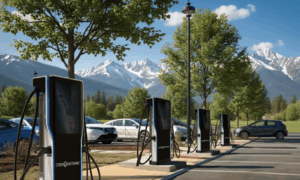
Home / EV Charging News / The Integration of Electric Cars with Renewable Energy Sources: How electric cars can be integrated into renewable energy systems for a more sustainable transportation ecosystem
Electric cars are a vital component of the transition towards sustainable transportation. To further enhance their environmental benefits, integrating electric cars with renewable energy sources presents a promising solution. This article explores how electric cars can be seamlessly integrated into renewable energy systems, creating a more sustainable transportation ecosystem.
Integrating electric cars with renewable energy sources offers numerous advantages:
Electric cars, powered by renewable energy, produce zero tailpipe emissions. By shifting away from fossil fuel-dependent transportation, we can significantly reduce greenhouse gas emissions, combating climate change and improving air quality.
Renewable energy sources, such as solar and wind, are abundant and domestically available in many regions. By harnessing these sources to power electric cars, countries can reduce their reliance on imported fossil fuels, enhancing energy independence and security.
Electric cars can act as mobile energy storage units and be integrated into smart grids. This allows for bidirectional energy flow, enabling the efficient management of electricity supply and demand. The stored energy in electric car batteries can be used to power homes and buildings during peak demand periods or emergencies.
While integrating electric cars with renewable energy presents exciting possibilities, several challenges need to be addressed:
The increased adoption of electric cars requires careful consideration of grid capacity and infrastructure upgrades. Charging infrastructure must be strategically placed to meet the growing demand, and grid management systems must be optimized to handle the load. Solutions include the installation of fast-charging stations, load management techniques, and grid reinforcement where necessary.
To meet the energy demand of electric cars, renewable energy generation capacity must be expanded. This involves scaling up solar, wind, and other renewable energy sources. Additionally, advancements in energy storage technologies, such as batteries, can ensure a consistent and reliable power supply for electric vehicles.
Government support in the form of financial incentives and policies can accelerate the integration of electric cars with renewable energy. These can include tax incentives, grants for charging infrastructure, and renewable energy production incentives. Additionally, policy frameworks can promote renewable energy generation and prioritize the use of clean energy in transportation.
To maximize the synergy between electric cars and renewable energy, several strategies can be implemented:
Time-of-use charging encourages electric car owners to charge their vehicles during periods of high renewable energy generation. This helps balance electricity demand and reduces the strain on the grid during peak times. Incentives such as lower electricity rates during off-peak hours can encourage this behavior.
Vehicle-to-grid technology allows electric cars to not only consume energy but also feed excess energy back into the grid when needed. This bi-directional flow of electricity supports grid stability, enhances renewable energy integration, and provides potential revenue streams for electric vehicle owners.
Developing charging infrastructure powered by renewable energy sources ensures that the energy used to charge electric cars is clean and sustainable. Solar-powered charging stations and wind-powered fast-charging hubs are examples of integrating renewable energy into the charging infrastructure network.
The integration of electric cars with renewable energy sources offers significant potential for creating a more sustainable transportation ecosystem. By leveraging the benefits of zero-emission transportation and renewable energy, we can reduce carbon emissions, enhance energy independence, and promote a cleaner and healthier environment. Overcoming challenges through grid integration, renewable energy expansion, and supportive policies will pave the way for a future where electric cars and renewable energy systems work hand in hand.



